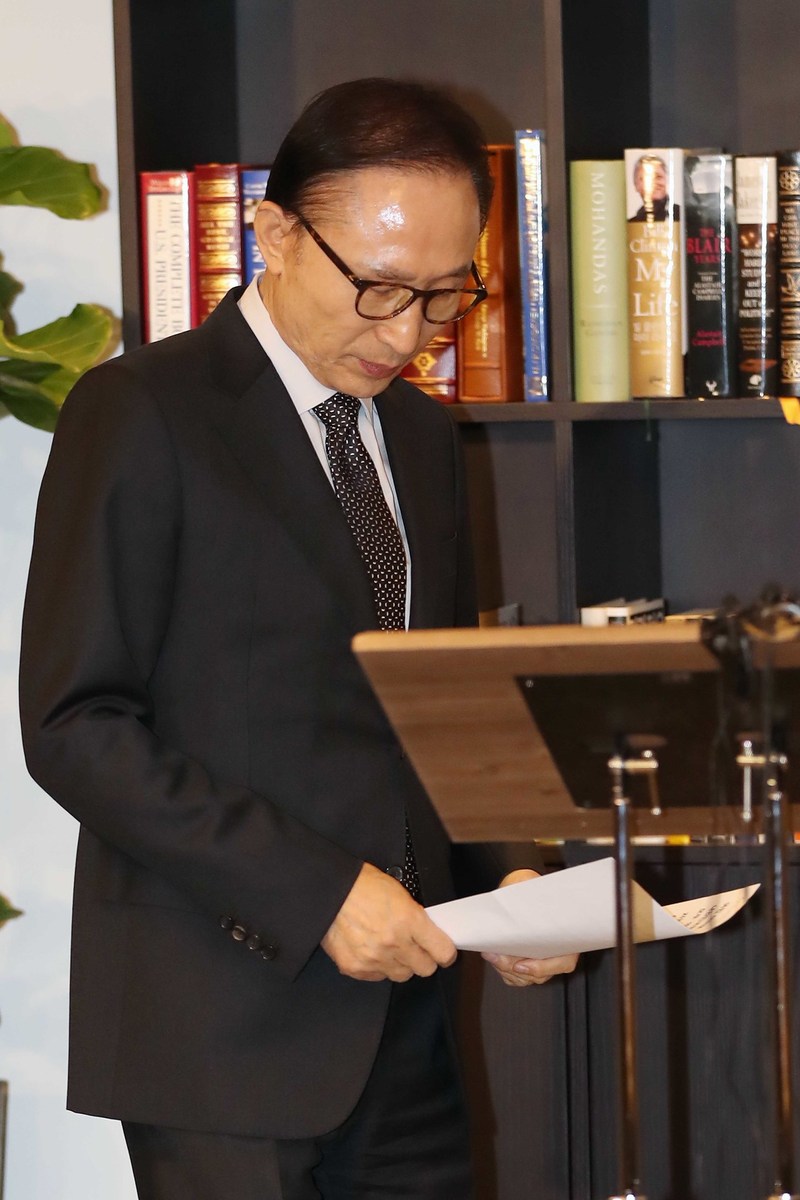 |
|
Former president Lee Myung-bak walks to the podium to make a public statement to address the NIS special activity fund scandal and other on-going prosecutorial investigations into his presidency at his office in the Gangnam district of Seoul on Jan. 17. (Photo Pool)
|
Search and seizure raises questions of company’s collusion with Lee Myung-bak administration
A search and seizure by prosecutors on the home and Samsung Electronics offices of former Future Strategy Office director (vice chairman) Lee Hak-soo on Feb. 8 and 9 is raising questions among Samsung’s possible collusion not only with the Park Geun-hye administration (2013–16) but also the Lee Myung-bak government (2008–13). Lee Hak-soo is currently facing charges in connection with litigation costs for the return of a DAS investment in BBK. Samsung received numerous benefits from the Lee Myung-bak administration around the time it paid the DAS litigation costs in 2009. The biggest of them was a special pardon for Samsung Electronics chairman Lee Kun-hee. Lee stepped down from active management at Samsung in 2008 following attorney and group legal team director Kim Yong-cheol’s slush fund revelations. Convicted in Aug. 2009 of tax evasion and breach of trust, Lee received a sentence of three years in prison suspended for five years. On Dec. 29 of the same year, he received a special pardon from President Lee, ostensibly to help Pyeongchang win its bid to host the Winter Olympics. The special pardon exclusively for Lee Kun-hee came four months after his verdict was finalized. The move prompted an outpouring of criticism at the time, with many contending it had granted huge benefits to a chaebol chairman for the uncertain goal of winning the Olympics bid. Some alleged that “behind-the-scenes transactions” had taken place between Samsung and the administration. With the timing of Samsung’s DAS litigation cost payment placing it just before Lee Kun-hee’s special pardon, prosecutors suspect a possible “back-scratching” arrangement. A Financial Holding Companies Act amendment passed by the National Assembly in July 2009 was also a source of controversy, with some observing contending it was intended for Samsung’s benefit. The amendment allowed financial holding companies to possess non-financial affiliates – meaning that financial companies like Samsung Life could have non-financial companies such as Samsung Electronics as affiliates after adopting a holding company system. It was denounced at the time by the group People’s Solidarity for Participatory Democracy (PSPD), which said it would “strengthen the Samsung controlling family’s financial position and facilitate the third-generation transfer of management authority.” The amendment was eliminated in 2014 when then-lawmaker Kim Ki-sik submitted a bill to abolish it. It was around the same time that financial authorities – adopting a passive interpretation of the Real Name Financial Transactions Act – declined to assess penalties on over 4 trillion won (US$3.7 billion) in Lee Kun-hee’s assets under borrowed names. Under the circumstances, evidence that Samsung did indeed pay over 3 billion won (US$2.8 million) in legal costs would seem to support the conclusion that the company opted to provide money where President Lee needed it rather than paying it to him directly. Attention is now turning to the connection between Lee Myung-bak, Lee Hak-soo, and Sejoong chairman Chun Shin-il. Lee Hak-soo, the subject of the prosecutors’ recent raid, is a fellow alumnus of Lee Myung-bak’s Korea University Business College, although sources report the two are not close. Having respectively entered the college in 1961 and 1966, the two were not enrolled at the same time. “There’s the age difference, and then there’s the fact that Hyundai Group and Samsung Group managers don’t traditionally associate,” a fellow alumnus of the two said. “My understanding is that it wasn’t a close personal relationship.” In light of that fact, some are raising the possibility a third party well acquainted with the two may have served as a bridge – with attention focusing in particular on Chun Shin-il. Chun and Lee were close enough for some to refer to the former as one as Lee’s closest associates. Chun was also well acquainted with Lee Hak-soo, as the former’s company Sejoong Namo Tour has a long history of transactions with Samsung, including many years of handling overseas business trips for company officials. Chun additionally served as head of the Korea University alumni association between 2007 and 2010. “There’s a possibility that an acquaintance of Lee Myung-bak’s related his situation to Samsung, which answered in kind,” another source with a background at Korea University said. By Choi Hyun-june, staff reporter and Kwack Jung-soo, business correspondent Please direct questions or comments to [english@hani.co.kr]






